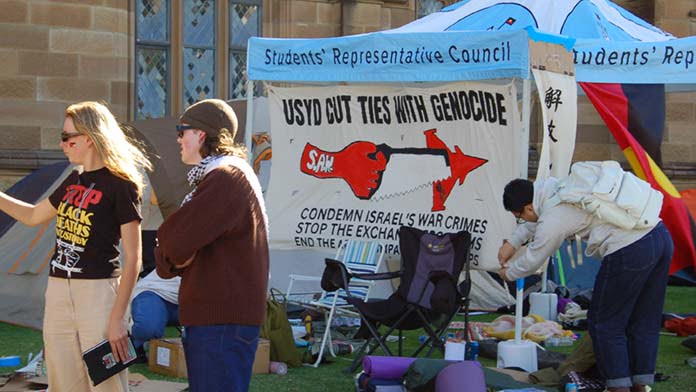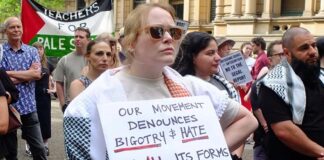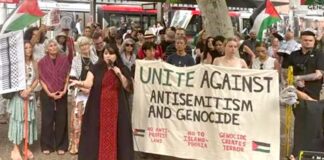The Gaza solidarity encampment at the University of Sydney has rejected an offer from management designed to have the camp clear out “and not resume”.
In an email to the entire university, Vice-Chancellor Mark Scott billed his offer to the encampment as “more comprehensive than offers accepted by other encampments around the country”.
In fact there was little in it. Their claim of action on “divestment” was simply a review of investments before an eventual university senate discussion on divestment options.
A working group, including students and staff, would conduct a drawn out “review” of the university’s defence industry partnerships and make recommendations. But there is zero guarantee of the university delivering divestment or any severing of ties.
Disclosure of research grants, research contracts and investments was later added. But any possibility of disclosure was heavily qualified by conditions including “confidentiality obligations, national security requirements, and the privacy, health and safety of our staff and students”.
While the encampment has galvanised and united existing supporters of Palestine including the student left, the Sydney Uni Muslim Students Association (SUMSA) and a number of new activists, the protests at the camp have drawn only a few hundred students.
While the largest protest, to defend the camp against a Zionist counter-rally, involved 500 people, at most 200 of these were students from Sydney Uni.
Melbourne Uni
Comparing this experience to that of the encampment at the University of Melbourne is useful for understanding where the movement needs to go next semester.
From the outset, a section of the organisers at Melbourne Uni set out to involve broader layers of students. They passed dozens of motions in classes and organised classes to walk out to join their first action of semester—a die-in outside the admin building.
After the encampment began, there were four rallies over the space of three weeks—the first drawing 500 people. They were built systematically in classes and at rallies off campus. Hundreds joined a WhatsApp chat and there were efforts to pull as many people into organising as possible.
The scale of the support galvanised the staff union, the NTEU, which hosted one of the major protests.
This meant that when the time came for escalation there was a base of student and staff support.
Three weeks into their encampment, students at Melbourne Uni occupied a building and re-named it Mahmoud’s Hall. Their sit-in lasted eight days and drew the participation of hundreds of students. In the face of threatened police attacks, staff formed picket lines outside the building.
At Sydney Uni, sections of the encampment have made attempts to reach out into the student body, producing bulletins to take to lecture halls and making the case to more students to get involved.
But this has not been the orientation of the whole camp. The encampment held two or three rallies a week over its initial weeks, making it difficult to seriously build any of them among students.
When two students were suspended for making lecture announcements about Palestine, some argued against making those announcements. A dogged commitment to maintaining the physical camp itself saw the need to build wider support sidelined at times.
So while the profile of Palestine campaigning on campus has been raised tremendously, there is still a task ahead to mobilise a broader number of students.
By contrast, at Melbourne Uni management was under real pressure and agreed to disclose all research partnerships with weapons manufacturers—although they later added qualifications to this. Whether they will deliver full disclosure is yet to be seen, but the campaign has built a solid base of support on campus to continue the fight.
Many of the other encampments around the country have wrapped up without concessions from management. At Curtin University in WA, the student guild signed a memorandum of understanding with university management on disclosure—but against the decision of the encampment itself.
University of Queensland has also promised UQ Muslim Students for Palestine and the student union to disclose research grants, contracts and investments with weapons companies annually.
Fighting to cut ties with weapons manufacturers challenges deeply entrenched university and government priorities. The universities are involved with weapons manufacturers because they seek to play a key role in the government’s efforts to expand the defence industry through projects like the AUKUS nuclear submarines as part of the drive to war with China.
It will take a truly mass movement to break those ties. The encampments have begun to raise these demands on campus but have also shown the gap between the support the campaign has and the sort of action needed.
The role of activists over the next semester will be to narrow that gap and begin to strike serious blows against university management.
By Angus Dermody






